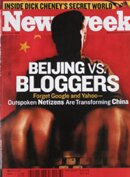After the sudden of burst of activity last week, when every second post here was about internet companies in China, AsiaPundit was not going to touch the topic today. However, Tom Zeller Jr today said something in the New York Times that struck a nerve.:
What if Chinese law required Internet companies to reveal the identities of all users who forwarded really bad e-mail jokes, lame chain letters or any messages containing the terms “free speech,” “Tiananmen Square” or “Super Freak,” because such activities carried a 10-year prison term?
“With all due respect to the memory of Rick James, the king of funk,” an executive might say, “we must abide by the laws of the countries in which we operate.”
And what if — as a mark of good faith for being permitted to do business in what any rational observer has to admit is now the most tantalizing Internet and technology market on the planet — an executive from each company were required to assist, mano a mano, in the beating of an imprisoned blogger?
While Tom makes a few interesting points, AsiaPundit is going to be “irrational” and suggest that China’s internet market is far from the most tantalizing on the planet. Off the top of the head, AsiaPundit would suggest that the most-tantalizing internet markets are — in descending order — the wealthy and tech-savvy United States, followed by the EU, e-commerce friendly Japan and possibly then the well-wired South Korea. China would certainly be in the top-10, and maybe even the top five, but it’s not the most tantalizing by a longshot.
Here’s a note from a MarketWatch item on Google’s prospects in China, issued after the China censorship issue was announced but ahead of the company’s earnings announcement. ():
One Wall Street analyst wrote in a report that Google’s China decision could cost more than it’s worth in the short term.
“We do not see meaningful revenue” in China for Google in the near term, UBS analyst Benjamin Schachter told clients Wednesday.
“We are concerned that the inevitable negative PR will damage Google’s brand,” wrote Schachter, who has a buy rating on Google shares.
Schachter downgraded Google to neutral after the earnings announcement, via Dow Jones:
UBS cut Google Inc. (GOOG) to neutral from buy, due to concerns over international revenue growth and the rising investment needed to potentially improve performance in key international markets.
The analysts said that while it agrees with Google that these markets provide important potential opportunities, it may take “longer than expected to effectively monetize them.”
UBS’ China analyst was bearish on the company’s prospects here ahead of the formal launch of the China portal:
Eric Wen, the UBS Internet analyst based in Asia, sums up what he believes are some of the prevailing issues in China for Google in a research report published this month.
Mr. Wen believes that Google is still testing the waters, and does not yet have a clear China strategy. Google has partnered with NetEase and Sina uses Google for some of its technology, but Google.com is facing a dilemma in China. The company recently began conforming to Chinese censorship standards, but Mr. Wen believes that Chinese users chose Google precisely because it was not censored. By conforming to the government standards, Google is trying to enable itself to enter the market in terms of attracting local businesses to advertise. However, by conforming, Google loses its differentiator. This is a dilemma for Google and the reason Mr. Wen believes that Google will not dominate the Chinese search market.
As Bill Bishop noted, China is not an essential market for Google to be in financially:
I am guessing that Google will be happy if they can generate $30M in revenue in China in 2006. Baidu, the market leader, is projected to generate somewhere between $65-70M in revenue in 2006. I believe Google is expected to generate over $8B in revenue worldwide in 2006. If my math is anywhere in the ballpark, China will account for LESS THAN 2 DAYS of Google’s 2006 revenue. And given the economics of the keyword value chain in China, that revenue should be significantly lower margin revenue than is US revenue. So if the China business went away, would investors care?
Perry Wu, in an exceptionally bearish item, says bluntly that Google will have about as much success as its Western rivals who are also getting lambasted on blogs, in the press and Congress. Basically, very little.:
Yahoo (YHOO) tried many times to adapt. As far back as 1998 (or Web 0.98 Beta) when its then-VP, Heather Killen, made high-profile visits to China, the Western Internet company tried to sit at the Chinese banquet table. But Yahoo finally gave up last year when it bought a billion dollar stake in China’s Alibaba.com and then gave Alibaba the rights to run Yahoo! China. There was not even a whimper from the company as its Chinese portal was torn down and replaced with a simple search engine. Sohu (SOHU), Sina (SINA), and Netease (NTES) had finally beaten the foreign interloper.
Lycos tried too. It bought firms like Myrice.com. Netscape tried, via AOL. MSN has also been bobbling along with a few victories here and a few setbacks there–nothing much to be proud of.
All of these companies have one thing in common: they entered China to win, but left only remnants of their power after a few years’ struggle. Chinese history is filled with tales of foreigners coming to the Middle Kingdom with money, but leaving the country poor, confused and embarrassed. Ask Chris Patten.
While the UBS boys, Wu, Bishop and others may be a touch , none are irrational. China’s internet penetration rate is still growing at an impressive pace, but the rate is slowing and the average user is still not deep-pocketed.
There’s a great deal of cash to be made in providing infrastructure for the build out of third-generation networks and broadband capacity, but there’s not a lot yet there for search- or advertising-based business models; certainly not when compared to Western markets.
Zeller is not the first pundit to hype the China market, most commentary seems to assume that the companies that are active here are putting principle at risk over in order to get massive returns. That’s far from true.
Technorati Tags: asia, blogs, censorship, china, cisco, east asia, economy, , japan, korea, media, microsoft, northeast asia, yahoo


 Let’s start with a quote from Liu Zhengrong, deputy chief of the Internet Affairs Bureau of the State Council Information Office, recently published in the China Daily:
Let’s start with a quote from Liu Zhengrong, deputy chief of the Internet Affairs Bureau of the State Council Information Office, recently published in the China Daily: Microsoft has also been cowardly, but nothing like Yahoo. Microsoft responded to a Chinese request by recently shutting down the outspoken blog of Michael Anti (who now works for the New York Times Beijing bureau). Microsoft also censors sensitive words in the Chinese version of its blog-hosting software; the blogger Rebecca MacKinnon found that it rejected as "prohibited language" the title "I Love Freedom of Speech, Human Rights and Democracy."
Microsoft has also been cowardly, but nothing like Yahoo. Microsoft responded to a Chinese request by recently shutting down the outspoken blog of Michael Anti (who now works for the New York Times Beijing bureau). Microsoft also censors sensitive words in the Chinese version of its blog-hosting software; the blogger Rebecca MacKinnon found that it rejected as "prohibited language" the title "I Love Freedom of Speech, Human Rights and Democracy." Cisco sells equipment to China that is used to maintain censorship controls, but as far as I can tell similar equipment is widely available, including from Chinese companies like Huawei. Cisco also enthusiastically peddles its equipment to the Chinese police. In short, Cisco in China is a bit sleazy but nothing like Yahoo.
Cisco sells equipment to China that is used to maintain censorship controls, but as far as I can tell similar equipment is widely available, including from Chinese companies like Huawei. Cisco also enthusiastically peddles its equipment to the Chinese police. In short, Cisco in China is a bit sleazy but nothing like Yahoo. Google strikes me as innocent of wrongdoing. True, Google has offered a censored version of its Chinese search engine, which will turn out the kind of results that the Communist Party would like (and thus will not be slowed down by filters and other impediments that now make it unattractive to Chinese users). But Google also kept its unexpurgated (and thus frustratingly slow) Chinese-language search engine available, so in effect its decision gave Chinese Web users more choices rather than fewer.
Google strikes me as innocent of wrongdoing. True, Google has offered a censored version of its Chinese search engine, which will turn out the kind of results that the Communist Party would like (and thus will not be slowed down by filters and other impediments that now make it unattractive to Chinese users). But Google also kept its unexpurgated (and thus frustratingly slow) Chinese-language search engine available, so in effect its decision gave Chinese Web users more choices rather than fewer.




 Writing in Shanghai in the 1930s, China’s great essayist Lu Xun(魯迅) once observed: "Today there are all kinds of weeklies. Although their distribution is not very wide, they are shining in the darkness like daggers, letting their comrades know who is attacking the old, strong castles."
Writing in Shanghai in the 1930s, China’s great essayist Lu Xun(魯迅) once observed: "Today there are all kinds of weeklies. Although their distribution is not very wide, they are shining in the darkness like daggers, letting their comrades know who is attacking the old, strong castles."

 My guess is that most bloggers do not know that certain laws restricting what can be said over the internet kick in once a parliamentary election is called. Some bloggers will be surprised that some of the things they say about Singapore politics may expose them to prosecution.
My guess is that most bloggers do not know that certain laws restricting what can be said over the internet kick in once a parliamentary election is called. Some bloggers will be surprised that some of the things they say about Singapore politics may expose them to prosecution.

 Would a Hong Kong-based economist publishing a report suggesting China understates GDP be committing a crime against the state? How about a journalist or a blogger getting leaked information about a politician or a company doing dodgy things? No one knows for sure.
Would a Hong Kong-based economist publishing a report suggesting China understates GDP be committing a crime against the state? How about a journalist or a blogger getting leaked information about a politician or a company doing dodgy things? No one knows for sure.




































